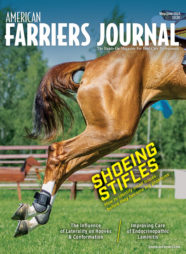Jason Maki owes a large debt of gratitude to the horse that broke his ribs. If the Texas A&M farrier hadn’t taken a hoof to the torso, he might have never become aware of a far more serious problem.
“The doc came back in and said, ‘Well, as far as the trauma goes, you have a bad contusion, bruising, and you’re going to be sore for a while, but you have a renal cell carcinoma on your right kidney …’ and I was like, ‘excuse me?’ That’s literally what I said,” Maki recalls to CVM Today, a publication of the university’s College of Veterinary Medicine and Biomedical Sciences. “I’m lying there and he repeated what he had said, like that would clarify things for me.”
Fortunately, the cancer has a 97% survival rate and since the cancer had not spread, removal of the kidney was all that was required.
“Long, but scary, story short, the cancer was all in the kidney, and now, my kidney’s gone,” he says. “Literally, when I was in there after my 2-week appointment, the doctor read that [prognosis] to me, and he said, ‘So, basically, that means you’re healed.’”
Maki believes that the cancer was the result of exposure to chemicals in a manufacturing job while not wearing a respirator. The chemicals are now known to cause kidney cancer. It’s a lesson well learned.
“It’s ironic — that bulldog mindset built the life that I have, but it almost took it away, as well; it would’ve killed me,” Maki says. “So, I’ve decided that has to be the lesson — I have to realize that as a person, and as an intellect, I have value beyond what I can do; that’s what I learned out of this.”
Maki began his horseshoeing career in rural Ohio as a way to save money for college, but eventually came to the realization that he had no interest in what he went to college for, and therefore dropped out to start his own farrier business.
This came to a head when he realized he wasn’t making much money and the injuries he sustained, such as breaking multiple bones, tearing his anterior cruciate ligament (ACL) and detaching a tricep tendon, were building up. That’s when a friend emailed him a job listing for his current position at A&M, where he’s been for 10 years and thriving.
“The beautiful thing about veterinary medicine, at large, and in my particular small role in taking care of horses’ feet, is that there’s always work to be done,” Maki says. “There’s always something new to learn, and there’s always a new way to look at something — multiple perspectives, multiple modes of input — so it’s multifactorial; you never run out of things to think about.”







Post a comment
Report Abusive Comment